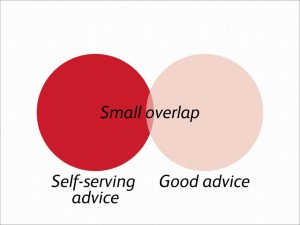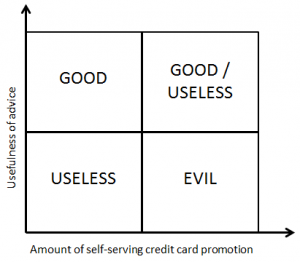In the points-n-miles world, there are occasional rumblings, particularly in the comment section of certain blogs, that some bloggers promote credit cards with little regard for whether or not their doing so is in the interests of their readers. To get some perspective on this issue, I recently read “Pound Foolish: Exposing the Dark Side of the Personal Finance Industry” by journalist Helaine Olen.
If you’re the type who enjoys hating on the likes of Dave Ramsey and Suze Orman, you’ll find plenty of red meat in this book. Of Orman’s ill-fated debit card product, Olen writes,
The experts–that is, the personal finance experts from newspaper columnists to bloggers and specialists in credit–were less enthused with the revolutionary aspect of Orman’s gambit. Almost everyone pointed to the fees charged, noting that, despite Orman’s claims, there were other debit cards with similar costs and significantly less in the way of surprise fees that could snag an unwary user…. If Orman stood to make money by encouraging consumers to use one particular debit card versus another–not to mention using debit cards over credit cards–how could anyone take any of her advice seriously on the topic again? “It is worth noting that if I tried to introduce my own card, the ethics editor would laugh me out of the New York Times building,” wrote Ron Lieber in the New York Times. (pp. 41-42)
As for Dave Ramsey:
Ramsey was an upper-middle-class real estate developer who went bankrupt because he attempted to leverage borrowed money into riches and failed. It was as if Ramsey had set himself up in the business of dealing Oxycontin in order to get rich and, instead, found himself addicted to the product. But the people he was preaching to–they’d gotten themselves addicted to the painkilling drug called credit because, well, they were in financial pain. They didn’t necessarily want to get rich, they just wanted to get by, something that became harder and harder to do in the United States of the 2000s. So they found Ramsey. But Ramsey wasn’t just another recovering debt and money addict. He’d finally figured out a way to become very, very rich.
And so forth and so on. If you’re a personal finance buff, you’ll probably enjoy it. I could probably spill a lot of ink giving my take on why things are screwed up, but this is what it boils down to:
Folks may differ over how big or small that overlap is, but that’s the essence of it. Speaking specifically of our little niche of the personal finance universe, I mentally map bloggers onto the PFD matrix:
The lower right quadrant consists of bloggers who intentionally lead readers to do worse than they otherwise would have done in order to enrich themselves. Deleting comments from people who point out better offers are available will definitely get you into this quadrant. Some of you may have less stringent criteria for admission into the quadrant of shame.
I’m not sure who would be in the lower left other than an aspiring Evil Blogger.
The upper left consists of bloggers who are willing to sacrifice short-term easy money in order to better serve their readers. I think a good number of these–though certainly not all–are people with full time jobs who do not rely on blog income to pay too many bills. (Being ethical is a little easier when your livelihood’s not at stake.)
The upper right is probably the quadrant people complain about the most, since there can be good advice that’s obscured by obnoxious advertising pitches.
Is there a good solution for the current situation? I can’t think of one. Credit card companies are going to do what they can to sell credit cards, and the fact that new accounts can be opened online on a whim leaves open a lot of opportunity for banks to corrupt bloggers. I imagine there’s less of this sort of thing in, say, the auto industry since most people don’t buy a car online after reading what a blogger has to say about it.
The best way I know of to handle this issue is for bloggers and commenters to call out conflicts of interest when they see them. Most blogs are written by human beings with a conscience who will respond to being shamed if they stray too far from acceptable norms. Some people think it’s mean to criticize other bloggers, but I would argue that knowledgeable criticism serves the public interest. If haters don’t hate, the sheep are more likely to get fleeced.


Your example is flawed. You overlook the fact that in this ever-growing travel community, the proliferation of tips, tricks, and deals is what is most toxic to our ecosystem. So in that vein, having a platform like a blog is already evil. On those rare days when an amazing deal is found, bloggers are inundated by annoyed commenters who tell them, “this was posted on FT like two hours ago dude stop trying to take credit,” or “you’re going to kill this deal.” Except bloggers rarely respond. Do you think bloggers repackage *free* information from forums back onto their blog because they have an altruistic notion of equality and cheap deals for all? Absolutely not. They do it to garner a strong readership and to be recognized as the information hub of the community. And hey, those referral bonuses aren’t too shabby either.
But what annoys me more than all the “information repackaging” is the sheer amount of redundancy in the blogging community. Sure, if every blogger had unique insights to share with us that’d be one thing. Instead, most bloggers sing several dozen permutations of the same tune day-in and day-out: “What the United devaluation means for you! Manufactured Spend with Bluebird! US Airways/AA Merger! No more AA lounge access with AMEX Platinum!”
This community is getting too loud and a lot of folks are annoyed at the people holding the megaphones. And I’ll tell you one thing: they’re not interested in talking theory using venn diagrams and quadrants about what to filter through that megaphone. They just want you to ditch the friggin’ megaphone.
“They” = “David”?
“They” ⊃ “David”
Nice.
In a way I agree with David. At least the old me did. But unfortunately the quiet unassuming travel gig we all loved is gone. Its been replaced by big money. There is lots of fertile ground with the apps. Tons of money is being made and many join the flocks daily. Its not going back to what it used to be.
Best way to handle the pimps is to NEVER use ANYONE’s affiliate link. That is the ONLY way to stamp out the chicanery and pimping.
I think your overlapping chart is off the mark. Instead of perhaps 10% overlap, it’s more like 95%. Nobody is blogging “for friends and family” anymore (and few bother pretending) – all have their eye on the $$$$. Some blogsters pretend they have ethics, but there’s little difference between aggressively pimping an inferior deal vs pimping the best deal – you are still pimping info that is almost surely regurgitated palaver. Why not just send readers to FT for the links if you are so ethical and altruistic?
Paul,
Could you consider a third route – that some blogs aren’t overly pimping either the best offer or the inferior offer, but instead are writing about matters that seem important (to them at least) ?